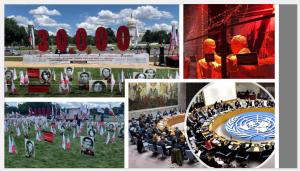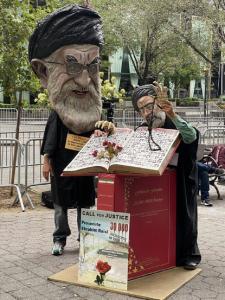(Video) Iran: Raisi asserts impunity with plan to attend UN General Assembly
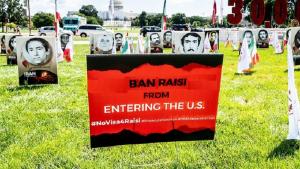
It has been reported that Iranian regime President Ebrahim Raisi is likely to attend next month’s United Nations General Assembly in New York. His presence at that event would afford him undue legitimacy in his “election” last year as he had the lowest voter.
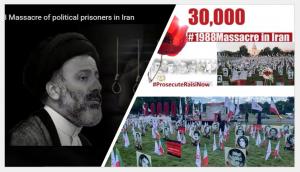
In 1988, Raisi was serving as deputy public prosecutor for the Iranian capital when he was designated to sit on the “death commission” that oversaw the interrogation and execution of political prisoners in Evin and Gohardasht Prisons.
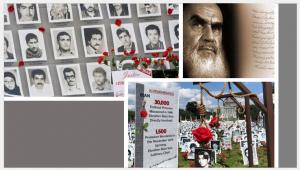
Survivors of that era report that Raisi was uniquely dedicated to the death commission’s mandate of carrying out a fatwa from Supreme Leader Ruhollah Khomeini, which declared that the People’s Mojahedin Organization of Iran (PMOI/MEK) is an “enemy of God."
Raisi’s commitment to the fatwa’s implementation was well-known that Khomeini personally expanded his authority to other regions before the massacre was over.
His presence at that event would afford him undue legitimacy in light of the fact that his “election” last year involved the lowest voter turnout in the history of the mullahs’ regime.
It would also signal the US government’s willingness to overlook the terrorist and otherwise criminal activities in Raisi’s background, which led to so much of the Iranian population rejecting his unopposed presidential candidacy.
In calling for a mass boycott of the June 2021 election, many Iranian activists condemned Raisi as the “butcher of Tehran”.
The phrase reflects a legacy that dates back to the summer of 1988 prison massacre of political prisoners but also includes incidents that took place in the months immediately preceding his ascension to the presidency.
In 1988, Raisi was serving as deputy public prosecutor for the Iranian capital when he was designated to sit on the “death commission” that oversaw the interrogation and execution of political prisoners in Evin and Gohardasht Prisons.
Survivors of that era consistently report that Raisi was uniquely dedicated to the death commission’s mandate of carrying out a fatwa from then-Supreme Leader Ruhollah Khomeini, which declared that members and supporters of the leading pro-democracy opposition group, the People’s Mojahedin Organization of Iran (PMOI/MEK) to be inherently guilty of “enmity against God” and thus subject to summary death sentences.
The ensuing massacre of political prisoners claimed over 30,000 lives nationwide, with around 90 percent of the victims being members or supporters of the MEK. Raisi’s death commission and Raisi himself were responsible for a greater number of those killings than any other official or entity.
In fact, Raisi’s commitment to the fatwa’s implementation was so well-recognized that Khomeini personally expanded his authority to other regions before the massacre was over.
Until former Gohardasht prison official, Hamid Noury was convicted of war crimes by a Swedish court this year, no one had ever been held accountable for that massacre, either inside Iran or on the world stage.
The United Nations recognized an upsurge in killings that year when it passed a general resolution on Iran’s human rights violations, but no concrete action was taken to punish the officials behind it or even to expose their role on a larger scale.
In September 2020, this was acknowledged as a mistake by several UN human rights experts, who noted in an open letter that the failure to act “had a devastating impact on the survivors and families as well as on the general situation of human rights in Iran.”
Nevertheless, silence persists throughout much of the international community with regard to the 1988 massacre.
And in recent years, the purveyors of that silence have been confronted with evidence that Tehran has not only declined to ever take responsibility for the killings but has continued to justify them, reward their perpetrators, and demonstrate an expectation of impunity with regard to this and other human rights issues.
Under the Iranian regime’s previous presidential administration, this impunity was demonstrated, for instance, with the appointment of two successive Ministers of Justice who had previously played highly recognizable roles in the 1988 massacre.
The message was strongly reinforced in 2019, when the regime’s Supreme Leader Ali Khamenei appointed Raisi as head of the regime’s judiciary, thereby signaling that future law enforcement policies would likely be guided by the same principles that underlay the massacre he led.
In November 2019, that interpretation of Khamenei’s decision was seemingly proven accurate, as Raisi oversaw major aspects of a crackdown on nationwide protests, in which security forces killed 1,500 people and landed thousands of others in jail.
Raisi’s judiciary even initiated a systematic campaign of torture against many of those arrestees, which lasted for months after November’s anti-government uprising and was highlighted to a global audience by organizations like Amnesty International.
But once again, no accountability was seriously pursued at any level, and Raisi was ultimately rewarded anew for his commitment to political violence when the supreme leader selected him to be the president of the regime.
Though the Iranian people roundly rejected that choice, Raisi has been in office for a full year now, and the impact of his ultra-hardline leadership is apparent in numerous aspects of the regime’s behavior.
Escalations of that behavior are by no means limited to Iran’s domestic affairs. It was widely anticipated that the Raisi administration would coincide with an upsurge in international terrorism, as well.
Before being appointed as judiciary chief, Raisi was also given stewardship over Astan-e Quds Razavi, a so-called religious foundation with a long track record of promoting and financing Islamic extremism and terrorist activity throughout the world. Raisi’s commitment to that role was entirely consistent with his commitment to implementing Khomeini’s fatwa and supporting Khamenei’s efforts to consolidate power.
His entire career shows that the current Iranian regime’s president is devoted to political violence as a tool for solving problems both at home and abroad.
It would be morally bankrupt for the US government to overlook that violence even if it were directed only against Iranian civilians.
But in light of Raisi’s connection to foreign terrorism, it is also decidedly against the international community if the US takes any steps to legitimize its leadership on the world stage.
Thus, it is vital that the US refuse any visa request from the Iranian regime’s president and bar him from setting foot on US soil unless federal law enforcement intends to arrest him for crimes against humanity.
In absence of such bold measures to challenge Tehran’s impunity, the US and Europe must send a clear message that neither Raisi nor other officials of this regime will be treated as legitimate or recognized as anything other than criminals and terrorists.
Shahin Gobadi
NCRI
+33 6 61 65 32 31
email us here
On June 23, 2022, former US Vice President Mike Pence visited Ashraf 3, the headquarters of the People's Mojahedin Organization of Iran (PMOI/MEK).
Legal Disclaimer:
EIN Presswire provides this news content "as is" without warranty of any kind. We do not accept any responsibility or liability for the accuracy, content, images, videos, licenses, completeness, legality, or reliability of the information contained in this article. If you have any complaints or copyright issues related to this article, kindly contact the author above.

